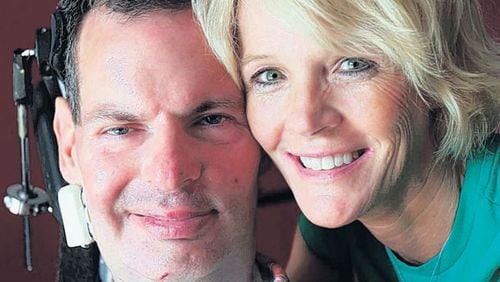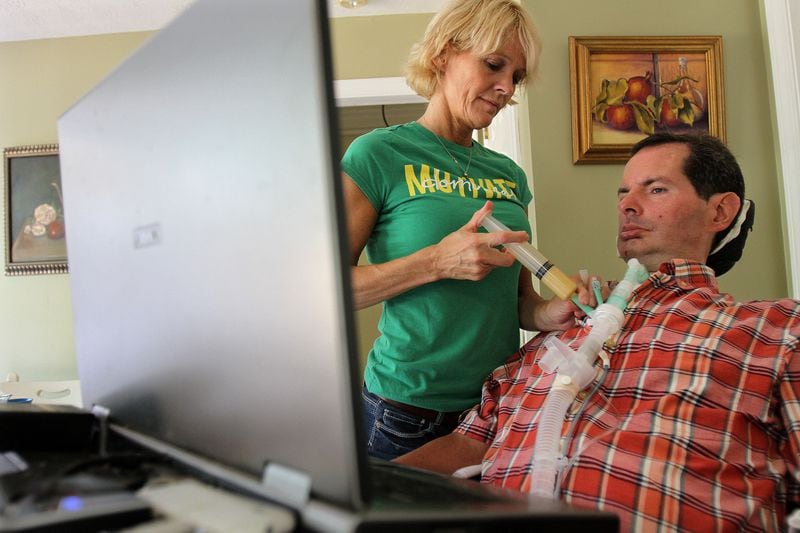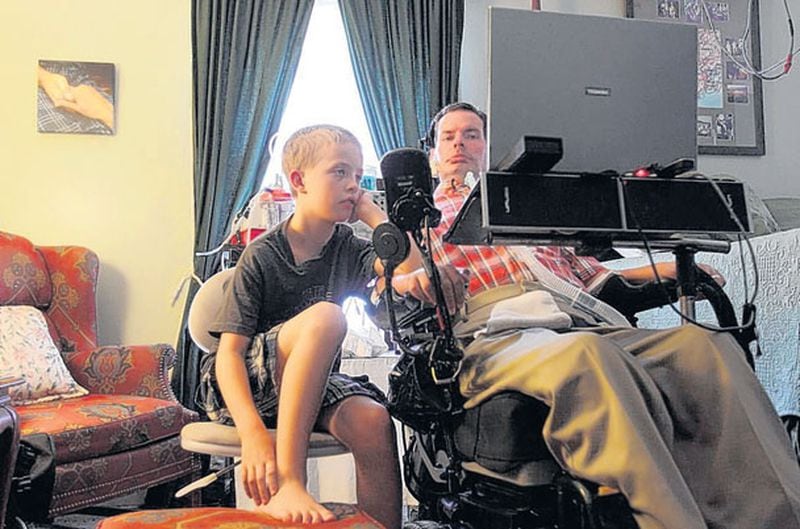Most Lou Gehrig's patients don't make a decade past diagnosis. Not David Jayne. He has lived with the disease for 23 years, thanks to technology and a refusal to give up. This year, he marked his 50th birthday — and married for the third time.
-------------
With an imperceptible twitch of his face, David Jayne activates a tiny device attached to his cheek and maneuvers his wheelchair about the room. He negotiates around furniture and steers clear of walls with no more effort than it takes to blink an eye.
Those same wireless signals that direct his chair are used to type words on the laptop mounted in front of him. He speaks through a computer, breathes through a machine and eats through a tube.
This year, Jayne passed a milestone few ever thought he could: He celebrated his 50th birthday.
By virtue of both an amazing array of technology and an iron will to survive, Jayne has lived for 23 years with amyotrophic lateral sclerosis, often called Lou Gehrig’s disease. Only one in 10 ALS patients make it 10 years past diagnosis.
But Jayne isn’t just surviving. He’s going about the business of living. This summer, he married for a third time. Carey Geyer, a Michigan native, fell in love with Jayne after the two met over the Internet talking about ALS, a disease that ultimately killed her father. Jayne, who lives in Rex, 15 miles south of downtown Atlanta, calls the union a “fairy-tale conclusion.”
Monday through Friday, he home-schools a stepson, 10-year-old Rickie Geyer, on everything from cells and DNA to explorers and Jamestown.
And his hard-headed refusal to give up has made him an inspirational figure in disabled circles and has brought national media attention.
“I can honestly say I have never been happier in my days on this big blue marble,” he wrote in an email. “I am thrilled to report I feel like the person I was prior to this diagnosis.”
It’s been a tortuous road to happiness after what he called “a long descent into hell.”
‘Keep believing’
Jayne said his 1998 decision to prolong his life and go on a ventilator has made him feel selfish for being a burden to family and friends. But he has not regretted the choice.
“When hope is allowed to die, nothing remains. I do not know if hope is spiritual, but is a life sustaining phenomenon,” Jayne wrote last summer in a blog. “I have witnessed too many friends with this damn disease die within weeks of relinquishing hope.”
In that blog, he hinted at his budding relationship. “A beautiful story is metamorphosing in my life, movie material, I hope to share soon that adds credence to this reality. Hang on and keep believing.”
Through the years, he’s seen generations of ALS patients come and go. Most don’t choose the artificial means to stay alive. Most don’t want to go on living that way.
ALS is a degenerative condition that strangles the motor neurons that transmit signals from the brain to the muscles, causing them to die. Jayne’s stubborn optimism has been tested repeatedly, in fact, almost daily. He’s watched his limbs wither, his voice go silent and his dreams of riches and a big family vanish.
But his Facebook site, his latest lifeline to the world, contains many reminders of him as an active, healthy young man. There are shots of him fishing, goofing off with college mates and waterskiing. Remembering the man he once was — not the guy stuck in that damn chair — allows him to maintain the cocksureness that drives him on.
In the past decade, he has thumbed his nose at a federal bureaucracy and then waged a national campaign to change that system. He became a guinea pig for some futuristic technology that almost did him in. He survived several caretakers who were unable to keep up with the demanding daily ritual needed to keep him alive.
“Believe me, it is not easy to hold on to optimistic beliefs when the hits just keep coming, in the depths of despair seemingly is the time to expect the impossible to occur,” he said.
In late 2000, The Atlanta Journal-Constitution featured a story of Jayne that described him giving a speech to a physical therapy class and attending a University of Georgia football game. Leaving home for such nonmedical-related activities, however, violated the terms for Medicare to provide him “homebound” patient care.
After the story appeared, his home care was cut off. Though he had known about the restrictions, he had decided to go on his excursions anyway. They were acts of civil disobedience.
Fueled by public outrage about Medicare’s actions, the Internet-savvy Jayne started a petition drive to change the law. The mission to ease the restrictions took him to Washington several times.
He won enthusiastic support from the likes of former Sen. Bob Dole, who had met Jayne in an airport. Dole called him a “hero.” The legislation Jayne pushed for ultimately was watered down but he was on hand when President George W. Bush signed a health care law that included a “homebound” provision.
“Bush came in, sat down and he waved at me like he knew me,” Jayne recounted. “I suspect he thought I was Christopher Reeve. That was a common misconception when I was roaming the halls up there.”
As he campaigned for a change in the law, his last working finger, used to click his computer, was dying. Fearing he would be “locked in,” unable to communicate, he agreed to take part in an experiment out of a science fiction movie. Electrodes were implanted in his brain. The electrical currents generated by this thoughts were supposed to move the cursor on his computer screen, as it had in monkeys and with a few human patients.
“I was buoyed thinking if this works it will benefit others,” he said. It didn’t work. The procedure led to infections, which took several operations to clear up.
In 2004, he married a Canadian woman who had moved to Atlanta to work as his caregiver. His parents had been overwhelmed by helping him; caretakers frequently came and went . And he thought he had romantic feelings for the woman.
“Desperate people do desperate things,” he said.
The marriage soon fell apart, leaving Jayne devastated.
“I arranged everything to be disconnected six years ago, but the thought of quitting after all the hell I have endured [ticked] me off enough that I canceled,” he wrote. “Deep inside, I maintained the hope, some day, if I didn’t fold, I would find the love and support of an extraordinary wife and family that I have now. I no longer feel like a hypocrite encouraging others to weather the storm.”
‘She understood my fear’
Two years ago, he started reconnecting with the ALS community on Facebook, which is where he met Carey Geyer.
He gave her advice on how her father could live with the disease as it progressed. They became friends, then visited.
“I tried pushing her away, but she understood my fear and did not relent,” he said. “On one of her visits, she touched my tracheotomy tube and began sobbing. Through her tears, she thanks me for the hell I have endured, thanks me for choosing to live and thanks me for loving her.”
Carey had never seen anyone living on a ventilator. It was awkward for the first few minutes when they finally met, she said.
“But he’s so easy to open up to; there was a real connection,” she said. “At first, I know his parents didn’t trust me. But this is real.”
She has replaced the live-in care givers and the Medicare-provided home-care providers. Caring for an ALS patient can be physically and emotionally draining. Getting his motionless, 6-foot-3 body out of bed in the morning with a hoist, then showering and shaving him can take three hours. He must have his tracheotomy tube suctioned several times during the day and have liquified food pumped into his stomach.
Carey, who now is Carey Jayne, has been married twice before, like her new husband. She has six children, three of whom are in college and three of whom now live with them in Rex. Jayne has two children, now grown, from his first wife.
“I thought it would freak the children out when they met him,” Carey said. “But they just clicked.”
Jayne and two of his stepchildren have written and released an illustrated children’s book, “Bubblegum Blues.”
Some people are wary of their relationship; Carey understands that. But there is really not much to get out him, she said. He lives on Social Security and disability payments from his old job.
“We just love each other,” she said.









